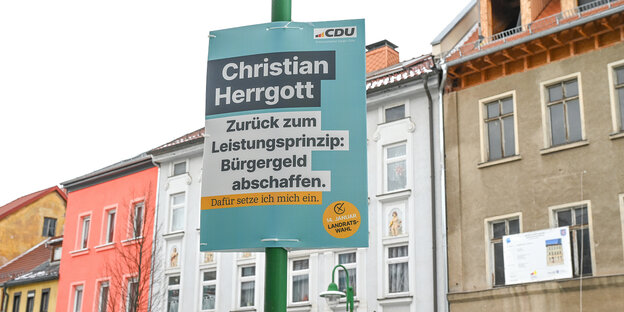The “Village Love for All” alliance supported the CDU election winner Herrgott, although it does not share his political convictions.

Positions taken by the AfD? CDU poster before the district elections in Pößneck, Saale-Orla district Photo: Daniel Biskup
taz: Mrs Grundmann, the AfD candidate Uwe Thrum lost the election. That was the objective of his alliance “people's love for all.” All's well That ends well?
Lena Grundmann: That's right, the objective was achieved in this district election. But we, as an alliance, wanted from the beginning to work politically in the long term, for example in understanding democracy. That's why we're not done yet, we're not there yet.
Christian Herrgott (CDU) is now the new district administrator. His alliance has not directly asked for his election.
No, and that was not easy for us. In many places we still criticize Christian Herrgott because he seems to have adopted some of the AfD's one-on-one objectives. But for us the priority was to prevent the AfD.
If he is now a district administrator, do you want to work with him?
Lena Grundmann He is 23 years old and is one of the 20 initiators of the “Village Love for All” alliance. He works in the rescue service and lives in Neustadt an der Orla.
This reflects that our understanding of politics and democracy is more than what happens in parliaments. For us it's about: How do you design a neighborhood, your town, or small-town life? We want to continue upholding our values in the future so that they are represented by the district administrator. We do not want to become dependent on partisan politics. Of course, as this election has shown, it matters when a far-right party threatens to come to power. This can definitely bring big changes. But we actually want to address this more in practical, everyday life.
Almost half of the voters still voted for Thrum, and Lord God was also well received by many. How do you want to convince them?
We are now planning the next steps. Now that the situation is a little more relaxed, we want to sit together in peace and exchange ideas. So we want to get to know the people of the Saale-Orla district better: because in the alliance there are only 20 people and of course it cannot be directly assumed that there are 80,000 more.
So are there many discussions to have first?
Exactly, and take advantage of the debates to develop a common basis and a common criticism of the decisions of recent years. They led to the current situation. From there we can address other solutions. This will be a difficult road. But as long as we address it and try to meet more and talk to each other again, it's definitely possible. However, this means that, fundamentally, not talking about rights ignores reality.
In the countryside do we have to talk about rights?
Yes, and I don't think we should rush to write “Nazi” categories on everything and everyone.
In their demonstrations against the AfD there were repeated clashes with the right.
Of course there are confrontations. Especially when the polarization is so clearly evident. But there is definitely still a possibility not to build walls between the fronts, but to overcome them.
Since information about a secret AfD meeting became known, hundreds of thousands of people across the country have been protesting against the AfD. What has this changed for you?
That's a very interesting question and I can't really answer it yet. But I think that how politics will change will not be decided in the cities. Rather, I think rural areas are particularly important when it comes to a shift to the right. For us, the protests created a broader audience.